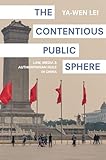The Contentious Public Sphere : Law, Media, and Authoritarian Rule in China / Ya-Wen Lei.
Material type: TextSeries: Princeton Studies in Contemporary China ; 2Publisher: Princeton, NJ : Princeton University Press, [2017]Copyright date: ©2018Description: 1 online resource (304 p.) : 18 line illus. 36 tablesContent type:
TextSeries: Princeton Studies in Contemporary China ; 2Publisher: Princeton, NJ : Princeton University Press, [2017]Copyright date: ©2018Description: 1 online resource (304 p.) : 18 line illus. 36 tablesContent type: - 9780691166865
- 9781400887941
- 320.951 23
- JQ1510 .L4523 2018
- JQ1516 .L4 2020
- online - DeGruyter
- Issued also in print.
| Item type | Current library | Call number | URL | Status | Notes | Barcode | |
|---|---|---|---|---|---|---|---|
 eBook
eBook
|
Biblioteca "Angelicum" Pont. Univ. S.Tommaso d'Aquino Nuvola online | online - DeGruyter (Browse shelf(Opens below)) | Online access | Not for loan (Accesso limitato) | Accesso per gli utenti autorizzati / Access for authorized users | (dgr)9781400887941 |
Browsing Biblioteca "Angelicum" Pont. Univ. S.Tommaso d'Aquino shelves, Shelving location: Nuvola online Close shelf browser (Hides shelf browser)

|

|

|

|

|

|

|
||
| online - DeGruyter The Concept of Presocratic Philosophy : Its Origin, Development, and Significance / | online - DeGruyter The Analytic Tradition in Philosophy, Volume 2 : A New Vision / | online - DeGruyter City of the Good : Nature, Religion, and the Ancient Search for What Is Right / | online - DeGruyter The Contentious Public Sphere : Law, Media, and Authoritarian Rule in China / | online - DeGruyter The Paradox of Vulnerability : States, Nationalism, and the Financial Crisis / | online - DeGruyter Seeing the World : How US Universities Make Knowledge in a Global Era / | online - DeGruyter Sufism : A New History of Islamic Mysticism / |
Frontmatter -- Contents -- List of Figures and Tables -- Acknowledgments -- Abbreviations -- Introduction -- The Rise of a Nationwide Contentious Public Sphere -- The Chinese State's Turn to Law and Rights -- Critical News Reporting and Legal - Media Collaborative Networks -- Extending Liberalization from the Press to the Internet -- An Emerging Online Public -- The Chinese State Strikes Back -- Conclusion -- Appendix -- Notes -- References -- Index
restricted access online access with authorization star
http://purl.org/coar/access_right/c_16ec
Since the mid-2000s, public opinion and debate in China have become increasingly common and consequential, despite the ongoing censorship of speech and regulation of civil society. How did this happen? In The Contentious Public Sphere, Ya-Wen Lei shows how the Chinese state drew on law, the media, and the Internet to further an authoritarian project of modernization, but in so doing, inadvertently created a nationwide public sphere in China-one the state must now endeavor to control. Lei examines the influence this unruly sphere has had on Chinese politics and the ways that the state has responded.Using interviews, newspaper articles, online texts, official documents, and national surveys, Lei shows that the development of the public sphere in China has provided an unprecedented forum for citizens to influence the public agenda, demand accountability from the government, and organize around the concepts of law and rights. She demonstrates how citizens came to understand themselves as legal subjects, how legal and media professionals began to collaborate in unexpected ways, and how existing conditions of political and economic fragmentation created unintended opportunities for political critique, particularly with the rise of the Internet. The emergence of this public sphere-and its uncertain future-is a pressing issue with important implications for the political prospects of the Chinese people.Investigating how individuals learn to use public discourse to influence politics, The Contentious Public Sphere offers new possibilities for thinking about the transformation of state-society relations.
Issued also in print.
Mode of access: Internet via World Wide Web.
In English.
Description based on online resource; title from PDF title page (publisher's Web site, viewed 27. Sep 2021)


